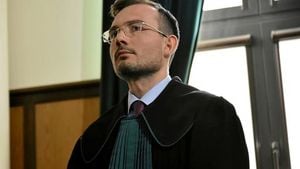Concerns are growing around Donald Trump’s mental fitness as his nephew Fred Trump III has openly suggested signs of dementia may be manifesting. During his recent appearance on SiriusXM’s The Dean Obeidallah Show, Fred shared troubling insights about his uncle, drawing on the family’s history with cognitive decline.
Fred Trump III published his concerns in light of his family’s problematic history with dementia, particularly citing their grandfather, Fred Trump Sr., and his late sister, Maryanne Trump Barry, who passed away last November. He stated emphatically, “I know what I saw in my grandfather,” adding, “It runs in the family.”
The stark revelations come from Fred’s observations of Donald Trump’s erratic behavior, especially his tendency to veer off message during speeches and public speaking events. He recalled, “the things he’s spewing and the craziness” as particularly alarming, indicating he has noticed significant changes.
Even though Fred Trump III isn’t a licensed medical professional, his personal encounters with family members suffering from dementia lend weight to his concerns. He pointed out how both his grandfather and aunt displayed signs of this degenerative disease during their lives, noting how it often manifests over time.
During the interview, Fred expressed regret, saying, “he looks older” and his demeanor suggests something might be awry. This sentiment reflects his worries about Donald as he prepares to campaign for the presidency again.
Political observers are increasingly concerned about Donald Trump’s ability to engage effectively with voters as he mounts another presidential bid. Criticism of his inability to maintain coherent discussions on topics at rallies amplifies the worries surrounding his cognitive state.
“He just can’t stick to a message. And he used to be able to stick to a message,” Fred lamented during the show, indicating fundamental shifts have occurred. His observations resonate with many who have watched Donald Trump's recent rallies.
Trump's increasing difficulty to stay focused on campaign themes during speeches—such as his recent claims about the economy—has raised eyebrows, invoking unsolicited commentary from onlookers and political analysts. Fred Trump III's remarks add another layer to this discourse, emphasizing the potential hereditary nature of cognitive issues within the Trump family.
Fred has already pointed out how others, including his cousin John Walters, suffered from dementia, highlighting the genetic predisposition of the family. This backdrop raises questions about the potential impact of familial health history on Donald Trump’s current condition.
His observations come as no surprise to some who have long questioned Trump’s mental sharpness, especially when he frequently pivots from topic to topic. Critics, including mental health professionals, have vocalized similar concerns, calling attention to the erratic behavioral patterns displayed by the former president.
Public interest surrounding Donald Trump’s mental condition has been exacerbated by his pointed criticism of President Biden’s cognitive ability during the last election campaign. Ironically, many polls suggest voters are now increasingly anxious about Trump’s own mental fitness as they prepare for the upcoming election.
Analysts have highlighted the irony as Donald, who has been quick to critique others for their mental acuity, is now facing similar scrutiny from his community and beyond. It begs the question: does the family history put him at greater risk?
Attention has drawn comparisons between Trump’s familial history with dementia and his own troubling behaviors. Concerns raised by family, particularly those close to him, add significant weight to the narrative taking shape.
Many are watching closely to see if these family dynamics will come to play as Trump seeks to sustain his political career. The intersection of personal history and political aspirations raises difficult questions about health, legacy, and the ability to lead.
Speculation about cognitive fitness is likely to remain at the forefront as voters approach the next election season. Whether these observations will have tangible effects on his candidacy remains to be seen.



